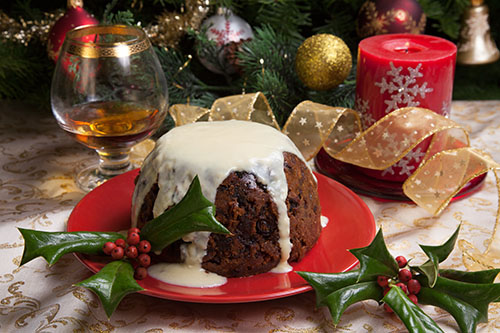With dictionary look up. Double click on any word for its definition.
This section is in advanced English and is only intended to be a guide, not to be taken too seriously!
Christmas puddings (aka. plum/figgy pudding) are a very rich, dark pudding made with all sorts of dried fruits, nuts, spices, black treacle and lotsof sherry or brandy. They are made well before Christmas as it takes time for the alcohol to soak into the dried fruit. They are steamed when first made, and re-steamed on Christmas Day before being served with a sweet white sauce or brandy butter. If the pudding is made at home, everyone in the household must take it in turns to stir the pudding and make a wish. Some people say that the mixture should be stirred from east to west, in honour of the three wise men.
Many households have their own recipe for Christmas pudding (see below); those that command the most pride have been handed down the family for generations. Essentially the recipe brings together what traditionally were expensive or luxurious ingredients - notably the sweet spices that are so important in developing its distinctive rich aroma. They are a round shape because they were traditionally boiled in a pudding cloth, and that's how we expect them to be, but at least since the beginning of the twentieth century they have usually been prepared in basins.
The forerunner of the Christmas pudding, a rich fruit pudding, was called Frumenty, was served in medieval times. Frumenty was a spiced porridge, enjoyed by both rich and poor. It has its origins in a Celtic legend of harvest god, Dagda, who stirred a porridge made up of all the good things of the earth, and served during the winter months. The pudding became specifically associated with Christmas, rather than merely any festive occasion, when it was introduced to the Royal Christmas dinner table by Prince Albert.
Initial cooking was usually done on Stir-up Sunday, and it involves steaming for many hours (the period can be shortened without loss of quality by using a pressure cooker). To serve, the pudding is reheated by steaming once more, (shop bought puddings can often be heated in the microwave) and dressed with warm brandy which is carefully set alight. The pudding is traditionally topped off with a sprig of holly.
"Stir-up Sunday" is the Sunday before Advent or or the twenty-fifth Sunday after Trinity, and occurs some time in late November, four to five weeks before Christmas. The Collect (or prayer) for that Sunday is in the Book of Common Prayer of the Church of England, it was used from the sixteenth century (and still is in more traditional churches):
"Stir up, we beseech thee, O Lord, the wills of thy faithful people; that they, plenteously bringing forth the fruit of good works, may by thee be plenteously rewarded; through Jesus Christ our Lord. Amen"
When they get home from church, everyone in the household, or at least every child, gives the pudding mixture a stir, and mades a pudding wish while doing so. You mustn't tell anyone what your wish is, or it won't come true.
In spite of Health and Safety regulations, some people still like to hide a coin or trinket in the Christmas pudding. This may have originated in the ancient custom, in Rome and elsewhere, of concealing a particular object in food. During the Roman festival of Saturnalia, a dried bean would be hidden in the food. Whoever found it was then "master of the revels" - a king for the holidays. Even a slave could be the lucky one. In medieval times, a cake was eaten on Twelfth Night (January 6), during the most boisterous party of the year. The "King of the Bean" ruled the whole party. Nowadays people put in a silver coin and eat carefully. Whoever gets the piece of pudding with the coin in on Christmas day is especially lucky and that "pudding wish" which was made when the pudding was stirred, will come true!
Of course, nowadays most people buy them in the supermarket and microwave them on Christmas day, and supermarkets daren't put any foreign bodies into the mix, so you're not likely to find a silver sixpence in a shop bought pud.
Every year there's a Christmas pudding race held in London to raise money for Cancer Research. The contestants have to carry a pudding round an obstacle course. (Watch the video if you don't believe me!)
Here's my Christmas pudding recipe (should be made in advance)
You can learn more about Christmas in the UK here

